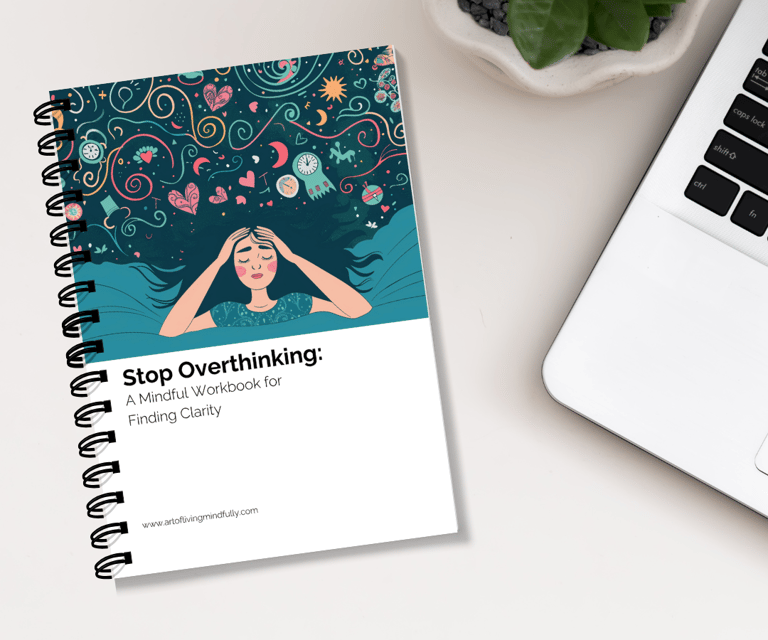3 Simple Ways to Stop Overthinking and Find Peace
Overthinking didn’t bring clarity—it created chaos. Journaling became my lifeline, a way to sort through the mental noise and finally find some peace.
Marj G
1/6/20253 min read
Have you ever found yourself lying awake at night, replaying a conversation or imagining all the ways something could go wrong? Overthinking can feel like being stuck in a mental loop, one that leaves you feeling drained and unsure of how to move forward.
I know this feeling all too well. For years, I let my thoughts run wild, believing I was being productive, when in reality, I was stuck. Overthinking didn’t bring clarity—it created chaos. Journaling became my lifeline, a way to sort through the mental noise and finally find some peace. Through my experience, I crafted Stop Overthinking: A Mindful Workbook and Journal for Finding Clarity to help others do the same. You don’t need hours or complicated routines to quiet your mind—just simple, intentional steps. Here are three ways to stop overthinking that you can start today.
1. Pause and Ground Yourself in Reality
Overthinking often pulls us away from reality, making small concerns feel larger than life. Grounding yourself in what’s real can interrupt this cycle and help you regain perspective.
Here’s how to get started:
Mindful Breathing: Pause and take a few deep breaths. Inhale for four counts, hold for four, and exhale for six. This small action signals your body to relax and brings your focus to the present.
Engage Your Senses: Look around and name:
Five things you can see.
Four things you can touch.
Three things you can hear.
Two things you can smell.
One thing you can taste.
Ask Grounding Questions:
“Is this happening now, or am I imagining it?”
“What’s the smallest step I can take to address this?”
“What would I tell a friend in this situation?”
These small steps pull you out of your head and back into the here and now, where solutions and clarity are easier to find.
2. Reframe Your Thoughts for Clarity
Overthinking thrives on worst-case scenarios and fears. Reframing helps you shift your perspective and approach challenges with more confidence.
Identify the Core Fear: Write down the thought causing your stress. What are you afraid might happen? Seeing it on paper often makes it feel less overwhelming.
Challenge the Thought: Ask yourself:
“Is this fact or assumption?”
“What evidence do I have to support this?”
“How likely is this outcome, really?”
Focus on Solutions: Shift your thinking from “What if it goes wrong?” to “What steps can I take to make this better?”
By reframing, you stop spiraling into unhelpful thoughts and start focusing on what’s within your control.
3. Bring Yourself Back to the Present
Mindfulness is about being fully aware of what’s happening right now. When you’re overthinking, it often means you’re fixated on something that isn’t happening in the present. The key is to redirect your focus back to what’s real.
Here’s how to practice mindfulness:
Create a Daily Ritual: Incorporate small moments of mindfulness into your routine:
Write in a journal each morning to clear your mind.
During meals, savor the taste and texture of each bite instead of rushing.
Before bed, write down three things you’re grateful for.
Move Your Body: Go for a walk, stretch, or do a quick workout. Physical movement helps release pent-up energy and reconnects your body with your mind.
Practice Self-Compassion: If you find yourself caught in overthinking, don’t judge yourself. Instead, acknowledge your feelings and gently guide your focus back to the present.
Mindfulness doesn’t require hours of meditation—it’s about finding small ways to stay present throughout your day.
Conclusion
Overthinking doesn’t have to control your life. By grounding yourself in reality, reframing your thoughts, and practicing mindfulness, you can take back control and find the clarity you deserve.
Through my own journey, I learned that something as simple as journaling can be transformative. That’s why I created Stop Overthinking: A Mindful Workbook and Journal for Finding Clarity—to offer tools that help you quiet your mind and embrace peace in a busy world.
Take the first step today. Peace isn’t a distant goal; it’s something you can create, right here, right now.


